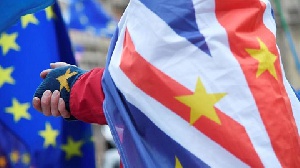
The UK said it will not extend the process beyond Dec 31
LONDON/BRUSSELS, May 16 (NNN-AGENCIES) — Very little progress” has been made in the latest round of UK-EU trade talks, the UK government said.
The UK’s negotiator David Frost said a far-reaching free trade agreement could be agreed before the end of the year “without major difficulties”.
But it was being held up by the EU’s desire to “bind” the UK to its laws and seek unfair access to fishing waters, he said.
The EU’s Michel Barnier suggested the UK’s own demands were “not realistic” and warned of a looming stalemate.
Speaking in Brussels, the bloc’s chief negotiator said: “no progress had been made on the most difficult issues”.
The EU, he added, would not accept a deal “at any price” and it was stepping up preparations for a no-deal outcome, in which the two sides would trade with each other under World Trade Organisation rules.
Asked what the chances were of an agreement, he said he was “still determined but not optimistic”.
Insisting the EU would not negotiate “in haste”, he said the UK must consider whether it was feasible to strike a deal before the end of 2020, when the current 11-month transition period is due to end.
The UK has said it will not extend the process beyond Dec 31, despite coming under growing pressure at home to allow more time for a deal due to the coronavirus pandemic.
The two sides have been discussing their future economic and security partnership following the UK’s withdrawal from the 27-member bloc on Jan 31.
In a statement, Frost said there was a “good understanding” between the negotiators but that little or no progress had been on the most “significant outstanding issues”.
The UK, he said, would not agree to “a so-called level playing field which would bind this country to EU law or standards, or determine our domestic legal regimes”.
A level-playing field is a term for a set of common rules and standards that prevent businesses in one country undercutting their rivals and gaining a competitive advantage over those operating in other countries.
The EU, Frost added, was seeking continued access to UK fishing waters after the transition period “in a way that is incompatible with our future status as an independent coastal state”.
“We very much need a change in EU approach for the next round beginning on 1 June.
“The UK will continue to work hard to find an agreement, for as long as there is a constructive process in being, and continues to believe that this is possible.”
Frost said the UK would make public all its draft legal texts next week so EU member states and interested observers “can see our approach in detail”.
In his update, Barnier said the EU’s aim was a “modern, forward-looking” agreement which would avoid any tariffs or quotas on trade.
But he said it was not prepared to “copy and paste” aspects of existing agreements with Canada, Japan and South Korea or do sector-by-sector deals “rooted in past precedents”.
Tariff-free access to the EU’s single market had to be accompanied by obligations, he added, and the UK could not “pick and choose” which of these it adhered to.
Barnier said he would listen to concerns the UK had about the treatment of British expats on the continent as part of the implementation of the Withdrawal Agreement governing the terms of the UK’s exit. — NNN-AGENCIES
